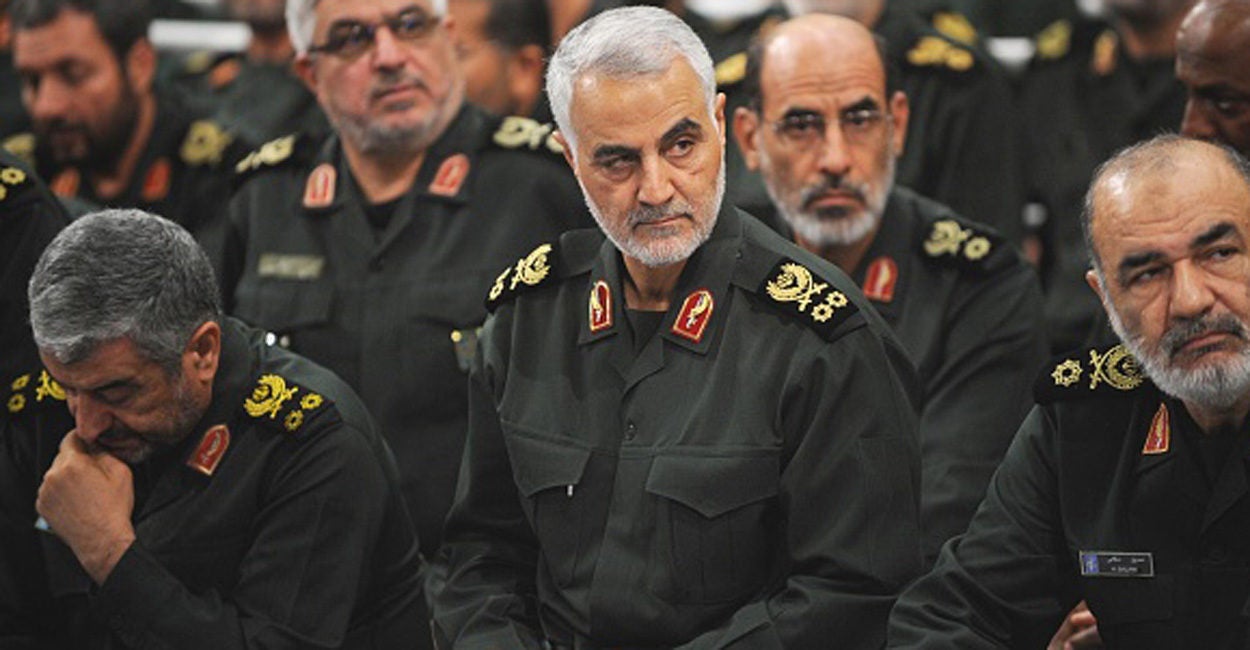Iranian Revolutionary Guard Corps' Quds Force commander Gen. Qassem Soleimani (center) is seen here in September 2016 in Tehran. The U.S. confirmed Thursday that it carried out an airstrike that killed him in Baghdad. (Photo: Iranian Supreme Leader Press Office /Anadolu Agency/ Getty Images)
President Donald Trump ordered an airstrike in Iraq on Thursday that killed Gen. Qassim Suleimani, one of the most senior members of the Iranian government. Suleimani, with the rank of major general, headed Iran’s Islamic Revolutionary Guard Corps, the terrorist arm of the Iranian regime.
“Soleimani made the death of innocent people his sick passion, contributing to terrorist plots as far away as New Delhi and London,” Trump said Friday, using an alternate spelling of the general’s name. “Today, we remember and honor the victims of Soleimani’s many atrocities, and we take comfort in knowing that his reign of terror is over.” For 21 years, Suleimani also commanded the the Revolutionary Guard’s Quds Force, charged with carrying out terrorist activities outside Iran’s borders as the country seeks to expand its regional influence in the Middle East. “We took action last night to stop a war. We did not take action to start a war,” Trump said.
Here are five things to know about the fallen terrorist leader.
1) How Was Suleimani a Direct Threat to Americans?
Suleimani orchestrated a series of attacks against U.S. forces in Iraq in the past several months, culminating in a rocket attack Dec. 27 that killed an American citizen, wounded four U.S. service members, and threatened the lives of many more American personnel.
Suleimani also ordered the recent assault on the U.S. Embassy in Baghdad, according to the State Department.
He supported lethal assistance to Revolutionary Guard proxy groups that targeted and killed more than 600 Americans between 2003 and 2011.
The State Department confirmed Friday that Suleimani was traveling in the Middle East, coordinating further “imminent large-scale attacks against U.S. diplomats and service members.” It added: “Threats were highly credible, and the intelligence is sound.”
2. Where Did Suleimani’s Terrorism Strike?
The Revolutionary Guard—under Suleimani’s direction—planned and conducted terrorist attacks across six continents and inside the United States, according to the State Department.
Suleimani was directly responsible for arming, funding, and training Iranian proxy groups—or militias—in Iraq, Syria, Lebanon, Bahrain, Yemen, Afghanistan, and elsewhere, leading to the deaths and injuries of tens of thousands, the State Department said.
Moreover, Iranian proxies regularly target and kill civilians and inflame existing sectarian conflicts.
3. What Actions Did He Take in Iraq?
The State Department says that Suleimani personally directed and provided arms to militias in Iraq for more than a decade, both during the Iraq War and as the U.S. military presence was winding down in the country. The Iran-backed militias threatened Iraq’s security forces and have targeted American citizens, diplomats, and military forces.
4. What Were His International Terrorist ‘Credentials’?
The State Department, the United Nations, and the European Union have roundly condemned Suleimani over the years. The United Nations and European Union also sanctioned him. In 2016, he was banned from international travel by U.N. Security Council Resolution 2231. Suleimani defied the U.N. resolution and continued traveling to work with terrorist militia groups in Iraq, Syria, and Lebanon. The European Union condemned him in a resolution in 2011 for supporting the regime of Syrian dictator Bashar Assad. U.N. Security Council Resolution 1747, in 2007, sanctioned Suleimani for his involvement in the Iranian nuclear program.
5. Were Prior Presidents Concerned About Suleimani?
“What the United States did yesterday should have been done long ago,” Trump said Friday.
The State Department, under the Trump administration, designated the Iranian Revolutionary Guard Corps as a foreign terrorist organization for its activities in 2019.
Though not militarily, Suleimani had been the target of the wrath of previous presidents of both parties. Trump’s Democratic predecessor, President Barack Obama, signed Executive Order 13224 designating Suleimani as a “specially designated global terrorist.” Obama also signed Executive Order 13572, citing the general for human rights abuses in 2011.
President George W. Bush, a Republican, signed Executive Order 13882 in 2007, imposing sanctions blocking access to assets and property of weapons distributors that provided material support to terrorists, including Suleimani.
[italics and colored emphasis mine]
the disorder of the world. - Karl Barth
The start of a new year is about new beginnings and setting goals— what has God called each of us to this year? At Open Doors, January reminds us of the importance of clarifying our vision, to see clearly what God has for us to do. We’re calling this effort 2020 Vision—an opportunity to see what the people of God are going through around the world; and then to stand with them in prayer and support. Will you join us? January | 2020 World Watch List
*Representative name or photo used to protect identity





This article summarizes how Suleimani, the Iranian general who was killed in a US strike, had been an active terrorist threat, most recently involved in attacks to the US embassy around Dec 30. According to point 1, US intelligence said that Suleimani was an "imminent" threat to US workers in the Middle East.
ReplyDeleteTo me, it would make sense to take action to prevent another tragedy at the hands of this man. However, it still remains unclear to me what those imminent threats were. I also wonder why the two prior presidents did not take action to kill this man - there must have been a good reason, given that both of them recognized the threat that he was. What changed this time around? I don't know.
-herb